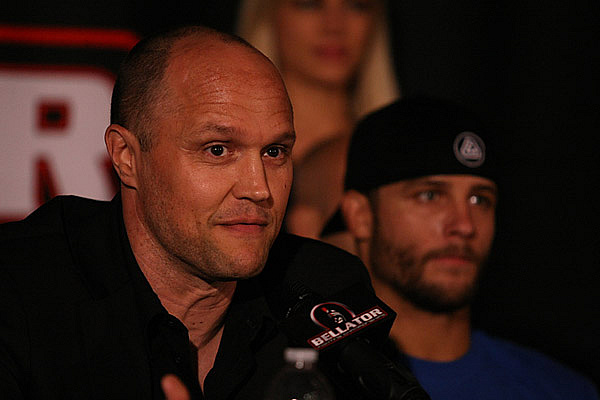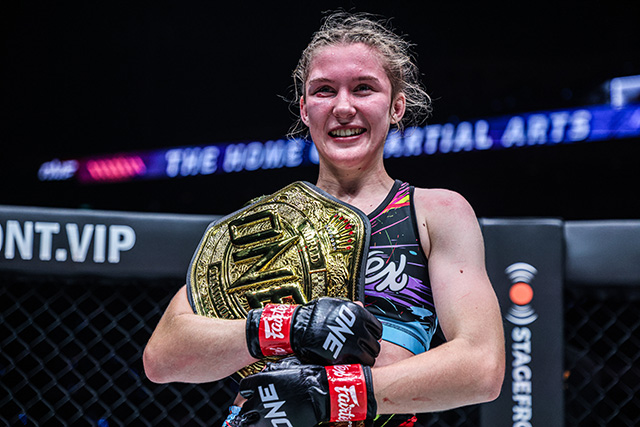Rebney: Bellator Developing According to Plan

Bellator CEO Bjorn Rebney is encouraged by the progress the
promotion has made. | Photo: Keith Mills
HEMPSTEAD, N.Y. -- Ahead of the forthcoming fifth season of Bellator Fighting Championships, expectations are high but tempered. Certainly, there are feelings that the product must continue to grow in order to maintain a sense of progress, but, at the same time, Bellator CEO Bjorn Rebney realizes his company has begun to occupy a comfortable space while other competing promotions have been swallowed up or gone bankrupt.
“When I started drafting out the business plans for this company, there was EliteXC, the IFL, Bodog [Fight], Affliction; there was everything,” Rebney told Sherdog.com. “They’ve all either failed or have been acquired by the UFC.”
Advertisement
“We have no vision towards acquisition, no vision towards sale,” he said. “We finally reached that position where we break even and we’re profitable. We’re in a great spot. The projections I made in terms of how much I would have to spend to get to this place were met.”
Despite the recent Zuffa LLC acquisition of Strikeforce,
Rebney takes a positive view of the new North American MMA
landscape.
“The way I look at it,” he said, “if you’re in business, less competition and having only two major players is good for us.”
At the same time, less competition tends to bring increased attention, especially from Zuffa. Strikeforce and EliteXC, as they grew in scope and undertook more direct competition with the Ultimate Fighting Championship, began to run into counter-programming from the UFC. As Bellator grows, it seems certain it will feel some of the same promotional pressures.
Over its history, Bellator has not signed a large amount of UFC washouts. However, the recent UFC ejection of Nate Marquardt provided a unique opportunity to sign a consensus Top 10 middleweight. Marquardt later signed with the British Association of Mixed Martial Arts.
“We talked to Nate; we talked to his people,” Rebney said. “It just wasn’t the right fit. We talked to him about super fights with [Bellator welterweight champion] Ben Askren. We talked to him about a fight against [Bellator middleweight champion Hector] Lombard.”
Though the option was explored, Rebney believes that developing Bellator’s own talent from within is the correct strategy in competing with Zuffa. Showcasing fighters like lightweight champion Eddie Alvarez and featherweight titleholder Joe Warren, neither of whom has ever fought inside the UFC, has become its modus operandi.
“We’ve had four full tournaments now. I think you can name on one hand the number of fighters who have been part of another extremely well-known organization,” Rebney said. “We signed Roger Huerta, Ryan Thomas … we really never focused on signing those kinds of guys. I would rather spend our time and energy developing [guys like] Rick Hawn, developing the next guy who comes out of the Olympics.”
In terms of developing Bellator’s own promotional product, MTV2 has provided a fit for the upstart company. Bellator signed a three-year agreement with the network that began in March.
“It’s live, it’s free and it’s in 82 million homes. It’s the largest concentration of young male viewers in cable television,” Rebney said. “I can catch them young, and then I can grow with them. They’re young guys who can get caught up in MMA by watching Bellator.”
However, on the surface, it seems as if a deal with FX -- widely rumored at the time of the MTV2 agreement -- would have been preferable. FX appears in more homes and seems to be more present in the collective consciousness of American TV viewers than MTV2.
Another criticism that has been a constant with Bellator since its inception surrounds its choice of venues. Though Bellator’s ticket sales seem to lag behind its apparent ratings progress, Rebney remains undaunted. In order to maintain a constant flow of capital into the company, he said it is important to keep venue costs down.
“There’s no vision for larger venues right now,” he said. “We improved very dramatically in Season 4. This is a marathon, not a sprint. It never ceases to amaze me when I see new promotions going into, like, the Target Center. Why? It’s all about knowing where your numbers are so every single month you have more money coming in than you have going out.”
Ultimately, visiting larger and larger venues would be a bonus, but the most important aspect of ticket sales is filling the arena, no matter what the size.
“If we’re playing a 2,300-seat hall and there is not an available seat in the house, and I’m covering our numbers on a monthly basis, it’s OK,” Rebney said. “I’ve been around this sport long enough to have no delusions of grandeur. I don’t need to be in the Staples Center.”







